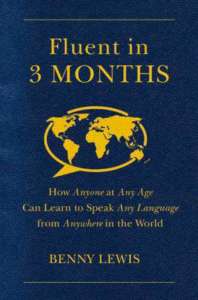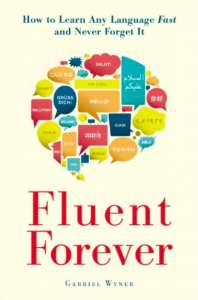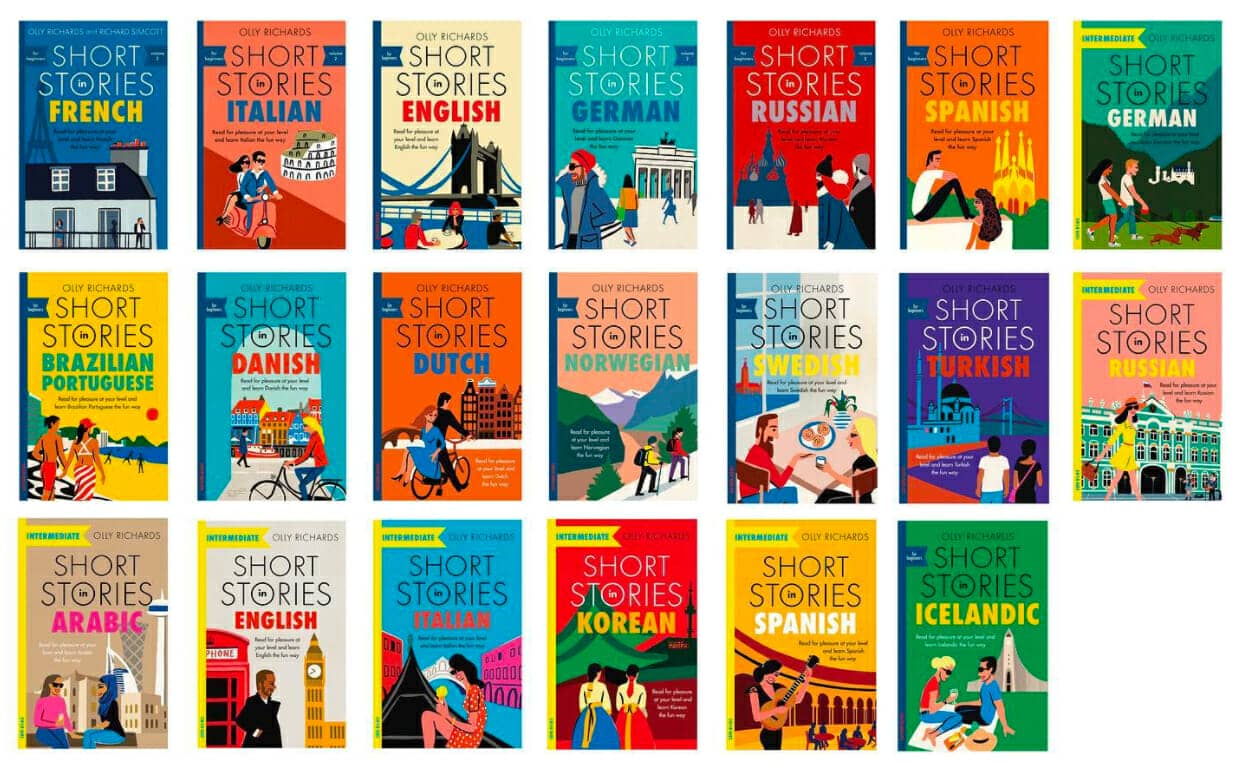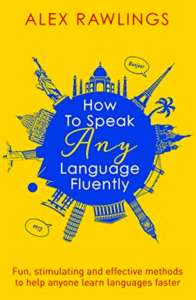 What makes a language learning book great?
What makes a language learning book great?
There are actually a few factors.
For one thing, the author has to have learned at least one other language. Believe it or not, there are tons of books out there in which this is not the case.
How is that possible?
Well, publishers find out that people are searching for easy ways to learn a language. So they want a piece of the pie, hire a researcher and a writer, and put a book out on the market.
As an avid language learner myself, someone who has learned other languages, I want to help you avoid buying a book that was farmed out in this manner.
I’ve also studied language learning as a topic for a long time. This list features the very best books I’ve encountered along the way.
So if you’re ready to think about learning any language in ways that make the journey faster and easier (or even just inspire you), let’s dive in!
5 Must-Read Language Learning Books
There are a few factors that make books about language learning good. The author must have:
- Learned at least one language other than their mother tongue
- Write reasonably well
- Give good examples
- Reference a variety of techniques
- Understand the science of memory
Not all books will be equally strong in all categories, but they’re general characteristics to look out for as you shop and read.
One: Fluent in 3 Months
Benny Lewis is an inspiring guy.
Long after I read Fluent in 3 Months, I saw him speak at a Polyglot Conference in Berlin. In Esperanto.
But even if you never get to see him demonstrate his bilingualism, Benny’s passion for language learning comes through on each and every page of this book.
Plus, he takes you deep into the most important aspect of making it happen:
Learning the language while you’re doing many other things at once. For example, Benny had jobs and the time-consuming matter of travel to factor into his language learning adventure.
Of all the books for learning languages, this one is highly relatable because you observe how it’s possible to fit it all in.
Plus, Benny gives a great mnemonic example in the book and encourages you to just get started with memory techniques.
As Benny notes, however, there’s one thing to watch out for:
Just about everyone is rusty with memory techniques based on associations in the beginning. Many of us haven’t used our imagination in any significant way since we were kids.
But once you get started memorizing foreign language vocabulary by modeling his examples, mnemonics will help you learn any language a lot faster.
I appreciate Benny’s approach to this form of active recall very much.
Two: Fluent Forever
Gabriel Wyner speaks a number of languages.
He’s also a memory master. His book Fluent Forever oozes with fantastic insights into how you can remember words and phrases faster.
The biggest impact this book had on my fluency journey involves his tips on making your own flashcards.
You see, before reading Fluent Forever, I used to place words in a Memory Palace Network without the benefit of any kind of flashcard whatsoever.
But Gabriel’s teaching on using drawings and colors just made so much sense. I had to give it a try.
I found it especially useful during the depressions I used to suffer, especially in the dark German winters.
But instead of stalling, I remembered Wyner’s suggestions and got out a bunch of colors and a notebook. As I was reading a German novel, I took words I needed to learn and made it happen. There was no way I was going to let depression stop me from learning German, after all.
Whenever I felt too foggy to use the standard Magnetic Memory Method, drew out an image that helped me memorize the word.
In this example, I drew Bender from Futurama with the drummer Steve Reich for the German word “bereich,” which means “area.”
Note that although you can’t see it in the drawing, I am using the Memory Palace method for language learning all the same. Using mental imagery, this mnemonic image takes place in an “area” inside Berlin Tegel airport:
I don’t use this more hands-on approach all the time, but when I’m tired or need to work quickly, his suggestion is now my go-to approach.
And it’s such a refreshing alternative to Anki. Though with a bit of experimentation, you can apply the principles to how you use any spaced-repetition software.
Three: Story Learning Books For Rapid Language Learning
Speaking of spaced-repetition, reading is by far the best way to get it in a way that is hassle-free, fun and deeply immersive.
Yet, it can be hard to find reading material that suits your level.
Olly Richards knew this fact based on his experiences with learning eight languages. To solve the problem of finding reading material that gives you sensible input based on your level, he created something special.
His “Storylearning” method.
According to more science that anyone has time to read, story helps us learn just about everything so much faster. Our brains are literally hardwired to retain more when we read about characters trying to solve problems.
As Olly explains, stories provide the same natural learning process that helps children pick up languages so quickly.
So who better than someone who has learned eight languages himself than to provide materials for other language learners?
I have his story books for German and Italian. They are both a delight to read and I’ve learned a ton from going through them.
Chances are, he has story books in the language you want to learn.
Four: How to Speak Any Language Fluently
So far we’ve covered finding time, using flashcards effectively and learning through story.
When it comes to the speaking part of learning a language, look no further than How to Speak Any Language Fluently by Alex Rawlings.
Strengths of the book include multiple examples of how language learners have put the emphasis on speaking practice.
Although the book could have included tips on writing in the language you’re learning, I don’t think that’s a fault. Most of us want to understand what we hear and be able to respond.
Amongst the many great concepts in the books, Rawlings introduces you to “behavior chains.” He also includes many tips on eliminating obstacles and structuring your time.
Five: Monolingual Dictionaries
Some people will frown upon the suggestion I’m about to make.
However, my favorite way to pick up words and phrases faster is to work with a print dictionary.
But not just any kind of dictionary: A monolingual dictionary.
In case you’re not familiar with the term, it means a dictionary in the language that you’re learning.
For example, if English is your mother tongue, then the English dictionary you have at home is a monolingual dictionary.
But one thing that many people learning languages do know is that you can get very simple dictionaries in just about any language. They are made for people learning the language or for young people who can’t read well enough yet to work with a dictionary for adults.
It can take some digging to find them in the language you want to learn. But it’s worth the effort.
And when you’re working with a native speaker as part of your language learning journey (which you should), you can ask them for help in finding one.
As an alternative approach, I’ve been finding a technique called “laddering” quite useful. I used to use it with dictionaries and language learning books, but I’ve found it possible to get help from chatGPT to learn languages in a fun and unique way.
Good Foreign Language Books Are Hard To Find
I hope you’ve enjoyed this list. I know from experience that finding a good book that helps accelerate the language learning journey can be difficult. That’s why my own language learning books are focused on helping you become a walking mnemonics dictionary.
That way, you can pick up any dictionary, novel or non-fiction book in the language you’re learning and use it to advance yourself along your personal journey to fluency.
Of course, books and other language learning resources can only ever be as good as the way you use them.
Please make sure that you aren’t reading passively. Take notes, apply the knowledge and do so consistently.
And when it comes to working with dictionaries, make sure you understand as much as you can about your memory.
A simple way to do this is taught in my FREE Memory Improvement Kit. Grab it here:
In it, you’ll learn how to create a simple Memory Palace Network for every letter of the alphabet.
Once you have that in place, you can rapidly absorb as much of any dictionary as you want.
So what do you say?
Are you ready to get out there and read the best books for language learning on the market?
Enjoy this journey and just shout out if you have any questions along the way about these book suggestions or anything else.
Related Posts
- Teach Yourself Using The Best Language Learning Books By Olly Richards
Olly Richards shares the background to his Teach Yourself language learning short story series of…
- Stoic Secrets For Using Memory Techniques With Language Learning
Christopher Huff shares his Stoic secrets for using memory techniques when learning a language. You'll…
- Teach Yourself Using The Best Language Learning Books By Olly Richards
Olly Richards shares the background to his Teach Yourself language learning short story series of…










